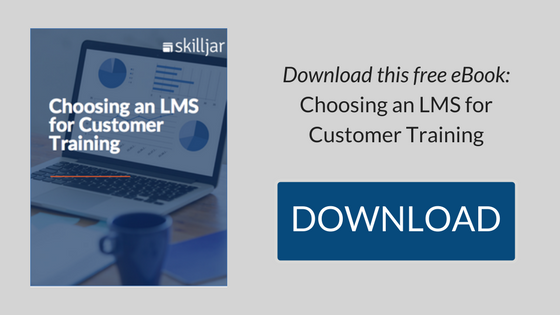 A key challenge for startups that sell to enterprises is overcoming objections based on company size. As the saying goes, "Nobody ever got fired for choosing IBM." Startups carry unknown risks of product stability, financial viability, and business continuity.
A key challenge for startups that sell to enterprises is overcoming objections based on company size. As the saying goes, "Nobody ever got fired for choosing IBM." Startups carry unknown risks of product stability, financial viability, and business continuity.
Yet there are many powerful advantages for enterprises that choose to work with startups, of course, assuming that the product and team are reasonably proven. Skilljar is fortunate to already be working with the Fortune 1000, as well as outstanding mid-market companies and high-growth startups.
In this blog post, we outline the benefits of working with a startup and key ways to mitigate risks.
Benefits of working with startups
- Startups will do whatever it takes to make you successful. A startup's success literally hinges on customer success. As a result, startups will provide white-glove support, build new features for you, solicit your feedback, and work around the clock. Customer success, product adoption, and usage are generally far more important than maximizing revenue
- Startups will often have best-fit products. As software becomes more prevalent, there are an increasing number of vertical-specific and use case-specific solutions that are optimized for your needs. The CRM industry, for example, is led by Salesforce, but there are literally hundreds of other CRMs available that are designed for companies of different sizes, verticals, and sales approaches. Another example is Skilljar - we have reimagined the traditional LMS and adapted it to customer and partner education.
- Startups will inspire innovation in your team. Enterprises are likely to have thousands of talented individuals with entrepreneurial mindsets. Working with startups helps foster an environment of making decisions quickly, thinking creatively, and operating with agility.
How to mitigate risks
There are also unique risks of working with a startup or privately held company. Here are some key questions to consider and ways to mitigate risk.
- How proven is the product? Being the first or the tenth enterprise customer is far more risky than being the hundredth. The earlier you are, the more likely the product is to have bugs, technical scalability issues, and even undergo the infamous "pivot." Depending on your needs, this may or may not be acceptable.
- What is your financial situation? Startups are unlikely to provide audited financial statements, and even so, they often intentionally operate at a loss. Still, it's fair to ask how many months of cash they have in the bank and to check whether they have access to additional funds in their existing investor base (for example, through venture capitalists). If you have doubts about financial viability within the length of your contract, ask for quarterly (or monthly) billing and/or a source code escrow.
- Can I talk to your customers? An important step in understanding risks is to talk with the startup's existing customers. Ask about why they originally decided to work with the startup, key positives, notable outcomes, and areas of improvement. Out of respect for their customers' time, expect that the startup may only be willing to provide references as a final step in the process.
- Can we meet in person? There's nothing like face-to-face interaction to assess whether you'd like to do business together. The larger the deal size, the more important it is to develop trust, particularly with the startup's CEO and/or founders. Your interaction with the company during the sales phase is likely indicative of what the relationship will be like during implementation and beyond. At Skilljar, both Jason and I take customer obsession and product quality very seriously, and we believe this comes across in our personal interactions and with every member of our team.
Conclusion
Working with startups isn't necessarily a risky proposition. If a startup's product best meets your needs, the highly responsive customer service, support, and rapid feedback cycle can be a refreshing and inspiring change from the typical enterprise vendor experience. Of course, you'll want to perform proper diligence on product, finances, and customer references to provide more assurance on the decision. Bottom line - if a startup is most likely to help you be successful, use the creative solutions mentioned above to maximize results and minimize risk.

